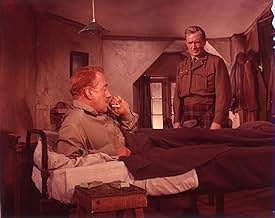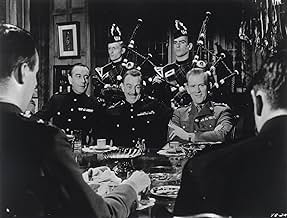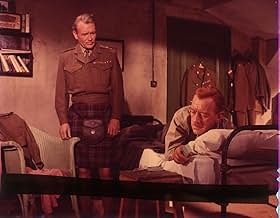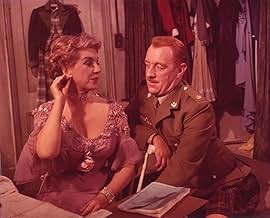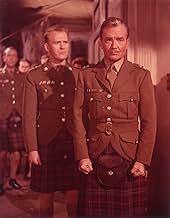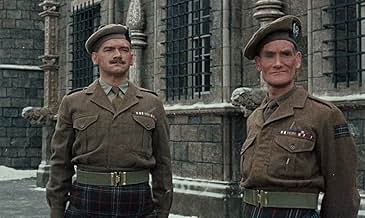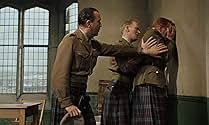Agrega una trama en tu idiomaAfter World War II, a Highland Regiment's acting Commanding Officer, who rose from the ranks, is replaced by a peace-time Oxford-educated Commanding Officer, leading to a dramatic conflict b... Leer todoAfter World War II, a Highland Regiment's acting Commanding Officer, who rose from the ranks, is replaced by a peace-time Oxford-educated Commanding Officer, leading to a dramatic conflict between the two.After World War II, a Highland Regiment's acting Commanding Officer, who rose from the ranks, is replaced by a peace-time Oxford-educated Commanding Officer, leading to a dramatic conflict between the two.
- Nominado a 1 premio Óscar
- 2 premios ganados y 7 nominaciones en total
Opiniones destacadas
I am not as enamored of "Tunes of Glory" as I am of, say, "Bridge on the River Kwai," but it is without question a powerful movie. The conflict between Sinclair and Barrow is palpable; I think, in particular, of Mill's violently trembling rage during the dancing scene, and Guinness's dismissive ridicule of Barrow's deepest confidences ("toy soldiers!") during his attempt to con him into clemency. Sinclair's grief-stricken collapse at the end is truly an unforgettable scene and a tribute to Guinness's power.
Sadly, for him, his informal barracks is going to be reformed under the auspices of the public school via Sandhurst graduate Lt. Col. Basil Barrow (John Mills) who believes in doing all things by-the-book. This sets the scene for a post WW2 power battle under a grey Scottish winter sky.
When writing a review of any excellent film - such as this - you are frightened you are going to put people off by its limits. However this is a classic example of less really being more. The claustrophobic atmosphere and the sense that armies without wars are prone to be heavy with politics. Not unlike like prisons: To many people in the same space with too much time on their hands. They drive men mad and extend the worst in the human character.
Guinness and Mills are fantastic actors. Oscar winners both and more. They could read the phone book and captivate an audience. For the record they had both seen war service, although Mills baby face and short stature had made him the butt of many jokes (many he was happy to re-tell). Did this help form his character? The guy who was laughed at and therefore worked even harder to enforce discipline or gain respect. This is, naturally, speculation.
I have no the knowledge of author (of book and film) but just by watching you know he has seen it for real. The little details that only the insider would know. The story would just as well be served as a theatre piece and it employs some its stock devices. The accidental narrator being the more obvious. Maybe this was to save money, but it would not have helped the picture to see - say - the incident that Mills had to endure from the Japanese.
Eyewitness testimony from the filming says that Guinness thought he would look silly in a kilt and used fake tanner on his pale legs. He is not the biggest of men and has to stick out his chest and stand on tiptoe to be imposing, but you do believe him. What an actor he was. An actor's actor. Like Peter Sellars, totally bland out of character (and not always very nice as he writes in his various autobiographies) but always mesmeric on screen. Mills - on the other hand - could never work as a bad guy. The perfect uncle figure who you would want to confide in.
(I am maybe giving the support cast short-shrift - but most British films of the time had quality character actors. No exception here. Amazing to see Susannah York in her first role.)
Alfred Hitchcock himself said Tunes of Glory was his own personal favourite film. It is not quite mine, but a great demonstration of how brilliant film can be when top class actors get their teeth in to a wonderful script. The end is pure Shakespeare. Don't watch it once, watch it twice...
Working from a tight, intelligent screenplay by James Kennaway (adapted from his own novel), Neame delivers a taut, insightful character driven drama that explores the diversity of human nature, and illustrates the good and evil contained within us all and the traits which ultimately determine which will be the prevalent manifestation of the individual personality. Through the device of placing the protagonist and the antagonist-- each the antithesis of the other-- in a no-win situation, the film examines motivations, actions and reactions that can lead the story in any number of directions, none of which are positive, but all of which are logical and which finally leads to a conclusion that is extremely powerful, incisive and totally believable.
As Jock Sinclair, you see Alec Guinness in a role quite unlike anything else he's ever done; it was, in fact, his own personal favorite of all of his cinematic creations. Sinclair is a man who is course and rough-hewn, an egoist who, when the personal need arises, will wantonly subject those around him to psychological cruelty in order to elevate himself and his position and to assuage his own ego. At mess, for example, he derides a young officer for not smoking his cigarette like a man; he orders every `man' to drink whiskey, implying that to do otherwise constitutes an assessment of an individual's masculinity. Boisterous bravura and ribald behavior are his tools of navigation through life, coupled with an attitude of doing things his way or the wrong way. And Guinness plays it to the hilts. Beginning with his whole perspective and attitude, he IS Sinclair, while physically he embodies and expresses exactly who this man is and what he stands for. At times, his eyes fairly bulge with an enthusiasm that suggests a lasciviousness underlying the cruelty; when he walks he strides purposefully, and carries himself in such a way that when he enters a room he veritably fills it and makes his presence felt so that the very air seems oppressed by him. It's a performance that, even in a strong year of Oscar contenders (Trevor Howard, Lancaster, Lemmon, Olivier and Tracy were all up for Best Actor-- Lancaster won) he deserved to be among them. In this film Guinness is quite simply unforgettable in one of his most powerful roles.
John Mills, as well, delivers a superb, introspective performance as Barrow, capturing the way in which this man must live so inwardly to survive, and conveying how difficult it is for him to continue on while attempting to live up to his heritage and the expectations of a position to which he is clearly unfit in his current mental state. In Barrow we see reflected the prevailing attitude of the times that `might makes right,' and that anything less is akin to unacceptable negligence, that same military mind-set that put Jake Holman at odds with the world in `The Sand Pebbles,' and led to the unfortunate incident depicted so eloquently in `A Few Good Men.' It's an excellent, understated, sensitive performance by Mills, who plays brilliantly off of Guinness's brutishness.
The film also boasts a number of excellent supporting performances, especially Dennis Price, as Major Charlie Scott, whose stoic assessment of himself as well as the situation at hand serves as the film's conscience; Gordon Jackson as the sympathetic Captain Jimmy Cairns; and Duncan Macrae in a memorable turn as Pipe Major Duncan MacLean.
Also included in this outstanding supporting cast are Kay Walsh (Mary), John Fraser (Ian), Susannah York (In her film debut as Morag Sinclair), Percy Herbert (Riddick), Allan Cuthbertson (Eric) and Angus Lennie (Orderly). A powerful film that so successfully demonstrates the devastating effects of dysfunctional human relationships and conveys the need to look beyond ourselves, `Tunes of Glory' presents a story to which everyone will be able to relate because the theme is applicable to any setting involving human interactions. A thoroughly involving film featuring a number of memorable performances (especially by Guinness) that will give you reason to take pause and reflect, and hopefully add some perspective to a world too often mired in unnecessary turmoil. I rate this one 10/10.
I would take issue with the reviewer who said that the Mills character would never have been given command. Clearly he had been highly educated, had a long and distinguished career in a headquarters job following a traumatic time as a POW of the Japanese. He would have at least earned some kind of moral right at the end of his career and in peacetime to be given the job that he believed he really wanted and might have thought to have been among friends. He would most likely have been highly respected owed favours and been able to pull strings. Had Jock Sinclair (Guinness) - unashamedly uneducated, rough and proud to have been educated in Barlinnie jail, Glasgow and deeply popular with his men not been the officer he replaced, most likely Colonel Barrow would have made a success of it. The whole entirely believable tragedy came about through the grotesque mischance that with these so different characters, one had to wrest command - and respect of the men - from the other. Colonel Barrow's fragility was only exposed when he tried to impose his English "civilising" ways on the one person whose whole being rejected them. Bad enough if it had been simply about class, here it was a battle for the Scottish soul. These deeper levels of conflict deriving from earlier historical intra-Scottish battles was suggested by one reviewer. The film tells a story which perhaps could have been set in almost any country with a strong military tradition - France. Germany, Japan etc rather like its near name-sake "Paths of Glory" by Stanley Kubrick set in WW1 France. Here though the central conflict presumably had very deep roots in Scottish ethnic and tribal history of clan wars, of Highlanders vs Lowlanders even of those supposed English-loving "traitors" who "sold" Scotland to "a parcel of rogues" (The English) in 1707. It may well be that for Sinclair, the entirely Anglicised Colonel Barrow (gin-drinking, aloof, distant and without a hint of a Scottish accent) represented exactly that kind of treacherous pseudo-Scot.
One reviewer describes it as "pure John Ford" leaving it unclear if he is suggesting that it was similar or derivative. With art in general, its lower and by definition least original forms ape others. This film does not ape any other - as already said the intensity of the conflict derives not just from class but from old old historical grievances between two intimately close nations. In "Old" Europe grievances and rivalries ran long and deep.
Just a rather sad footnote. One reviewer mentioned similarities to earlier John Ford/John Wayne movies. The entire John Wayne archive is to be seen on a continuously circulating basis on two of Britain's five national television channels State broadcaster the BBC and so-called public service broadcaster Channel 4. Yet in contrast Tunes of Glory has rarely been shown. It reappeared 2 years ago but in a poor quality print on a remote satellite channel which plays mainly public domain material. Many of Britain's fine vigorous quality films of the 1960s have never been shown at all on British television until a few months ago when again a very minor satellite channel started showing them: Otley, The Hireling, The Reckoning and others. I did not see them originally and it was revelation seeing the bold acting and directing talent which existed then and how sad is the current decline into the Lock Stock etc formulaic gangster stuff. Very curious indeed that great British films are not shown on the supposed British public service channels and it is left to small satellite channels Movies4Men and Simply Movies to show them. Very curious indeed. Public service broadcasting not in the service of the public.
¿Sabías que…?
- TriviaSir Alec Guinness was offered the role of Lieutenant Colonel Barrow, but asked for the role of Major Sinclair instead. He then suggested Sir John Mills for the other role.
- ErroresPipe Major MacLean is never shown with a set of bagpipes. In particular, he is a mere observer at band practice. A pipe major is not only the leader of the band but also its chief instructor, and it is unthinkable that he would not play an active role in all practices.
- Citas
Major Jock Sinclair, D.S.O., M.M.: We're on a first name basis in this regiment. Your first name is Derek. My first name is Major.
- ConexionesFeatured in Film Extra: Alec Guiness (1973)
Selecciones populares
- How long is Tunes of Glory?Con tecnología de Alexa
Detalles
- Fecha de lanzamiento
- País de origen
- Idioma
- También se conoce como
- Tunes of Glory
- Locaciones de filmación
- Stirling Castle, Stirling, Escocia, Reino Unido(establishing shots)
- Productoras
- Ver más créditos de la compañía en IMDbPro
- Tiempo de ejecución
- 1h 47min(107 min)
- Color
- Relación de aspecto
- 1.66 : 1


